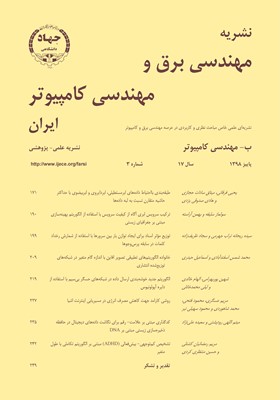ترکیب سرویس ابری آگاه از کیفیت سرویس با استفاده از الگوریتم بهینهسازی مبتنی بر جغرافیای زیستی
محورهای موضوعی : مهندسی برق و کامپیوترسولماز سلیقه 1 , بهمن آراسته 2 *
1 - دانشگاه آزاد اسلامی واحد تبریز
2 - دانشگاه آزاد اسلامی واحد تبریز
کلید واژه: رایانش ابریمعماری سرویسگراترکیب سرویسکیفیت سرویسالگوریتم بهینهسازی جغرافیای زیستی,
چکیده مقاله :
توسعه سریع کاربردهای رایانش ابری منجر به انتشار سرویسهای ابری زیادی در محیط ابر شده است. سرویسهای ساده موجود در محیط ابر قادر به پاسخگویی به درخواستهای پیچیده و مختلف موجود در دنیای واقعی نخواهند بود. لذا برای ایجاد سرویس مرکب مورد نیاز میبایست سرویسهای مختلف انتخاب و ترکیب شوند. ترکیب سرویسهای ابری آگاه از کیفیت سرویس یکی از چالشهای مهم در محاسبات سرویسگرا است. از آنجایی که تعداد سرویسهای ساده ارائهشده خیلی زیاد است، بنابراین مسأله انتخاب و ترکیب سرویسها یک مسأله Np-Hard است. در این تحقیق برای حل این مشکل الگوریتم بهینهسازی جغرافیای زیستی مورد استفاده قرار گرفته است. برای ارزیابی روش پیشنهادی آزمایشهای متعددی در 5 سناریوی مختلف با تعداد وظایف و تعداد سرویسهای مختلف در محیط Matlab انجام شده است. سرعت همگرایی روش پیشنهادی در ایجاد سرویس مرکب مورد نیاز بیشتر از سرعت همگرایی الگوریتمهای ژنتیک و ازدحام ذرات است. همچنین کیفیت سرویسهای مرکب ایجادشده به عنوان معیار ارزیابی دیگر مورد توجه میباشد. میزان گذردهی و نرخ موفقیت روش پیشنهادی به ترتیب برابر 999/0 و 998/0 میباشد. همچنین متوسط انحراف معیار در 30 اجرای روش پیشنهادی کمتر از 021/0 است. تمامی این مقادیر نشاندهنده برتری روش پیشنهادی نسبت به روشهای مبتنی بر ژنتیک و ذرات میباشد.
Fast development in the utilization of cloud computing leads to publishing more cloud services on the cloud environment. The single and simple services cannot satisfy the users’ real-world complex requirements. To create a complex service, it is necessary to select and compose a set of simple services. Therefore, it is essential to embed a service composition system in cloud computing environment. Service composition is one of the important NP-hard problems in the service-oriented computings. In this paper, a biogeography-based optimization algorithm is used to create the optimal composite-services. The proposed method was simulated and executed on five different scenarios with different number of tasks and candidate services. The throughput of the proposed method, genetic algorithm and particle swarm optimization algorithm are respectively 0.9997, 0.9975 and 0.9994; furthermore, the reliability of these methods are respectively 0.9993, 0.9980 and 0.9982. The results of simulations indicate that the proposed method outperforms the previous methods in the same conditions in terms of throughput, successability, reliability, response time, and stability.
[1] Y. Jadeja and K. Modi, "Cloud computing-concepts, architecture and challenges," in Proc. Int. Conf. on Computing, Electronics and Electrical Technologies, ICCEET'12, pp. 877-880, Kumaracoil, India, 21-22 Mar. 2012.
[2] T. Dillon, C. Wu, and E. Chang, "Cloud computing: issues and challenges," in Proc. 24th IEEE Int. Conf. on Advanced Information Networking and Applications, AINA'10, pp. 27-33, Perth, Australia, 20-23 Apr. 2010.
[3] A. Jula, E. Sundararajan, and Z. Othman, "Cloud computing service composition: a systematic literature review," Expert Syst. Appl., vol. 41, no. 8, pp. 3809-3824, Jun. 2014.
[4] A. Jula, Z. Othman, and E. Sundararajan, "Imperialist competitive algorithm with PROCLUS classifier for service time optimization in cloud computing service composition," Expert Syst. Appl., vol. 42, no. 1, pp. 135-145, Jan. 2015.
[5] Z. Ye, X. Zhou, and A. Bouguettaya, "Genetic algorithm based QoS-aware service compositions in cloud computing," Database Systems for Advanced Applications, DASFAA'11, Part II, LNCS 6588, pp. 321–334, 2011.
[6] Q. Wu and Q. Zhu, "Transactional and QoS-aware dynamic service composition based on ant colony optimization," Futur. Gener. Comput. Syst., vol. 29, no. 5, pp. 1112-1119, Jul. 2013.
[7] S. Wang, Q. Sun, H. Zou, and F. Yang, "Particle swarm optimization with skyline operator for fast cloud-based web service composition," Mob. Networks Appl., vol. 18, no. 1, pp. 116-121, Feb. 2013.
[8] O. K. Qtaish, Z. BtJamaludin, and M. Mahmuddin, "Multi-path QoS-aware service composition," Int. J. Eng. Res. Appl., vol. 2, no. 2, pp. 2248-9622, Mar./Apr. 2012.
[9] A. Bhaduri, "A clonal selection based shuffled frog leaping algorithm," in Proc. IEEE Int. on Advance Computing Conf., IACC'09, pp. 125-130, Patiala, India, 6-7 Mar. 2009.
[10] Z. Yang, C. Shang, Q. Liu, and C. Zhao, "A dynamic web services composition algorithm based on the combination of ant colony algorithm and genetic algorithm," J. Comput. Inf. Syst., vol. 6, no. 8, pp. 2617-2622, 2010.
[11] N. H. Rostami, E. Kheirkhah, and M. Jalali, "An optimized semantic web service composition method based on clustering and ant colony algorithm," arXiv Prepr. arXiv1402.2271, 2014.
[12] G. Zou, Y. Chen, Y. Yang, R. Huang, and Y. Xu, "AI planning and combinatorial optimization for web service composition in cloud computing," in Proc. Int. Conf. on Cloud Computing and Virtualization, 8 pp., Singapore, 17-18 May 2010.
[13] A. A. P. Kazem, H. Pedram, and H. Abolhassani, "BNQM: a bayesian network based QoS model for grid service composition," Expert Syst. Appl., vol. 42, no. 20, pp. 6828-6843, 15 Nov. 2015.
[14] E. Al-Masri and Q. H. Mahmoud, "Investigating web services on the world wide web," in Proc. of the 17th Int. Conf. on World Wide Web, pp. 795-804, Beijing, China, 21-25 Apr. 2008.
[15] D. Simon, "Biogeography-based optimization," IEEE Trans. Evol. Comput., vol. 12, no. 6, pp. 702-713, Dec. 2008.

